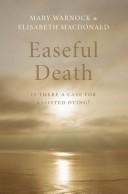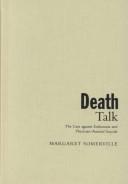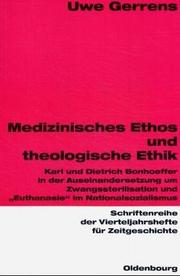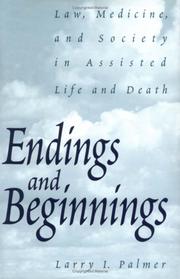| Listing 1 - 10 of 20 | << page >> |
Sort by
|

ISBN: 1280502193 9786610502196 0198035152 1602568448 9780198035152 0195184130 9780195184136 9780195154436 0195154436 9781280502194 6610502196 9781602568440 0190288566 0197707602 Year: 2023 Publisher: Oxford : Oxford University Press,
Abstract | Keywords | Export | Availability | Bookmark
 Loading...
Loading...Choose an application
- Reference Manager
- EndNote
- RefWorks (Direct export to RefWorks)
Ian Dowbiggin tells the dramatic story of those reformers who struggled throughout the 20th century to change the nation's attitudes towards mercy-killing and assisted suicide.
Euthanasia --- Assisted death (Euthanasia) --- Assisted dying (Euthanasia) --- Death, Assisted (Euthanasia) --- Death, Mercy --- Dying, Assisted (Euthanasia) --- Killing, Mercy --- Mercy death --- Mercy killing --- Homicide --- Medical ethics --- Assisted suicide --- Right to die --- History.

ISBN: 1846422760 1417504447 9781417504442 9781846422768 185302709X 9781853027093 Year: 2001 Publisher: London ; Philadelphia : Jessica Kingsley Publishers,
Abstract | Keywords | Export | Availability | Bookmark
 Loading...
Loading...Choose an application
- Reference Manager
- EndNote
- RefWorks (Direct export to RefWorks)
Drawing on a variety of historical, contemporary, anthropological and literary sources, this book considers the present day debates about the sanctity of elderly lives and the question of euthanasia. The book shows that killing the elderly, voluntarily or involuntarily, has been a feature of many societies, from the primitive to the present day.
Age discrimination --- Euthanasia --- Homicide --- Older people --- Assisted death (Euthanasia) --- Assisted dying (Euthanasia) --- Death, Assisted (Euthanasia) --- Death, Mercy --- Dying, Assisted (Euthanasia) --- Killing, Mercy --- Mercy death --- Mercy killing --- Medical ethics --- Assisted suicide --- Right to die --- Abuse of --- Crimes against

ISBN: 9786612157219 1400826772 1282157213 0691102635 9781400826773 9781282157217 9780691133904 0691133905 0691133905 9780691133904 Year: 2007 Publisher: Princeton, N.J. Woodstock Princeton University Press
Abstract | Keywords | Export | Availability | Bookmark
 Loading...
Loading...Choose an application
- Reference Manager
- EndNote
- RefWorks (Direct export to RefWorks)
How we die reveals much about how we live. In this provocative book, Shai Lavi traces the history of euthanasia in the United States to show how changing attitudes toward death reflect new and troubling ways of experiencing pain, hope, and freedom. Lavi begins with the historical meaning of euthanasia as signifying an "easeful death." Over time, he shows, the term came to mean a death blessed by the grace of God, and later, medical hastening of death. Lavi illustrates these changes with compelling accounts of changes at the deathbed. He takes us from early nineteenth-century deathbeds governed by religion through the medicalization of death with the physician presiding over the deathbed, to the legalization of physician-assisted suicide. Unlike previous books, which have focused on law and technique as explanations for the rise of euthanasia, this book asks why law and technique have come to play such a central role in the way we die. What is at stake in the modern way of dying is not human progress, but rather a fundamental change in the way we experience life in the face of death, Lavi argues. In attempting to gain control over death, he maintains, we may unintentionally have ceded control to policy makers and bio-scientific enterprises.
Euthanasia --- Assisted death (Euthanasia) --- Assisted dying (Euthanasia) --- Death, Assisted (Euthanasia) --- Death, Mercy --- Dying, Assisted (Euthanasia) --- Killing, Mercy --- Mercy death --- Mercy killing --- Homicide --- Medical ethics --- Assisted suicide --- Right to die --- History.

ISBN: 3486567195 348659625X 1306782465 Year: 2003 Publisher: De Gruyter
Abstract | Keywords | Export | Availability | Bookmark
 Loading...
Loading...Choose an application
- Reference Manager
- EndNote
- RefWorks (Direct export to RefWorks)
Die Studie verknüpft zwei für das NS-Regime zentrale Aspekte: den globalen Krieg als Voraussetzung der nationalsozialistischen ";Lebensraum";-Utopie und Gesundheitspolitik, der als Instrument biologistischer Formung des ";Volkskörpers"; zentrale Bedeutung für die Gesellschaftspolitik des ";Dritten Reiches"; zukam. Winfried Süß untersucht den Krieg als intervenierenden Faktor innenpolitischer Entscheidungen und sozialer Verhältnisse. Im Mittelpunkt steht die Frage, wie sich Funktion, Handlungsspielräume und Wirkungen der Gesundheitspolitik seit dem September 1939 veränderten. Dabei werden bislang unverbundene Erkenntnisebenen zusammengeführt: zeit- und medizingeschichtliche Fragestellungen, gesundheitspolitische Prozesse und ihre sozialgeschichtlichen Folgen, zentralstaatliche, regionale und lokale Handlungsarenen. Erstmals wird das Handeln Karl Brandts, einer gesundheitspolitischen Schlüsselfigur der Kriegsjahre, umfassend dargestellt. Hitlers Begleitarzt und Generalkommissar für das Sanitäts- und Gesundheitswesen agierte an der Schnittstelle zwischen den ";heilenden";, ausgrenzenden und vernichtenden Elementen nationalsozialistischer Gesundheitspolitik - ausgestattet mit weitreichenden Kompetenzen sowohl für den Krankenmord als auch die medizinische Versorgung der Wehrmacht und Zivilbevölkerung.
History of Germany and Austria --- anno 1940-1949 --- anno 1930-1939 --- Euthanasia --- Medical ethics --- World War, 1939-1945 --- History. --- History --- Atrocities. --- Assisted death (Euthanasia) --- Assisted dying (Euthanasia) --- Death, Assisted (Euthanasia) --- Death, Mercy --- Dying, Assisted (Euthanasia) --- Killing, Mercy --- Mercy death --- Mercy killing --- Homicide --- Assisted suicide --- Right to die
Book
ISBN: 0773589155 9780773589155 9780773589162 0773589163 9780773543768 0773543767 Year: 2014 Publisher: Montréal, Québec : McGill-Queen's University Press,
Abstract | Keywords | Export | Availability | Bookmark
 Loading...
Loading...Choose an application
- Reference Manager
- EndNote
- RefWorks (Direct export to RefWorks)
Death Talk asks why, when our society has rejected euthanasia for over two thousand years, are we now considering legalizing it? Has euthanasia been promoted by deliberately confusing it with other ethically acceptable acts? What is the relation between pain relief treatments that could shorten life and euthanasia? How do journalistic values and media ethics affect the public's perception of euthanasia? What impact would the legalization of euthanasia have on concepts of human rights, human responsibilities, and human ethics? Can we imagine teaching young physicians how to put their patients to death? There are vast ethical, legal, and social differences between natural death and euthanasia. In Death Talk, Margaret Somerville argues that legalizing euthanasia would cause irreparable harm to society's value of respect for human life, which in secular societies is carried primarily by the institutions of law and medicine. Death has always been a central focus of the discussion that we engage in as individuals and as a society in searching for meaning in life. Moreover, we accommodate the inevitable reality of death into the living of our lives by discussing it, that is, through "death talk." Until the last twenty years this discussion occurred largely as part of the practice of organized religion. Today, in industrialized western societies, the euthanasia debate provides a context for such discussion and is part of the search for a new societal-cultural paradigm. Seeking to balance the "death talk" articulated in the euthanasia debate with "life talk," Somerville identifies the very serious harms for individuals and society that would result from accepting euthanasia. A sense of the unfolding euthanasia debate is captured through the inclusion of Somerville's responses to or commentaries on several other authors' contributions.
Euthanasia. --- Assisted suicide. --- Assisted death (Assisted suicide) --- Assisted dying (Assisted suicide) --- Death, Assisted (Assisted suicide) --- Doctor-assisted suicide --- Dying, Assisted (Assisted suicide) --- Patient-directed death --- Patient-directed dying --- Physician-assisted suicide --- Suicide --- Euthanasia --- Assisted death (Euthanasia) --- Assisted dying (Euthanasia) --- Death, Assisted (Euthanasia) --- Death, Mercy --- Dying, Assisted (Euthanasia) --- Killing, Mercy --- Mercy death --- Mercy killing --- Homicide --- Medical ethics --- Assisted suicide --- Right to die

ISBN: 1281371343 9786611371340 019153868X 9780191538681 9781281371348 9780199539901 0199539901 9780199561841 0199561842 0191580023 9780191580024 6611371346 1383044821 Year: 2008 Publisher: Oxford : Oxford University Press,
Abstract | Keywords | Export | Availability | Bookmark
 Loading...
Loading...Choose an application
- Reference Manager
- EndNote
- RefWorks (Direct export to RefWorks)
'Easeful Death' sets out the arguments for and against the legalization of assisted suicide and euthanasia. Exploring the philosophical and legal debates as well as the medical practicalities of this sensitive issue, the authors ultimately conclude that the law should embrace a more compassionate approach to assisted dying.
Euthanasia. --- Assisted suicide. --- Death --- Assisted death (Assisted suicide) --- Assisted dying (Assisted suicide) --- Death, Assisted (Assisted suicide) --- Doctor-assisted suicide --- Dying, Assisted (Assisted suicide) --- Patient-directed death --- Patient-directed dying --- Physician-assisted suicide --- Suicide --- Euthanasia --- Assisted death (Euthanasia) --- Assisted dying (Euthanasia) --- Death, Assisted (Euthanasia) --- Death, Mercy --- Dying, Assisted (Euthanasia) --- Killing, Mercy --- Mercy death --- Mercy killing --- Homicide --- Medical ethics --- Assisted suicide --- Right to die --- Social aspects. --- Professional ethics. Deontology --- Attitude to Death. --- Ethics, Medical. --- Suicide, Assisted. --- Moral and ethical aspects. --- Law and legislation.

ISBN: 1282859390 9786612859397 0773569316 9780773569317 0773522018 077352245X 9780773522015 9780773522459 Year: 2001 Publisher: Montreal : McGill-Queen's University Press,
Abstract | Keywords | Export | Availability | Bookmark
 Loading...
Loading...Choose an application
- Reference Manager
- EndNote
- RefWorks (Direct export to RefWorks)
There are vast ethical, legal, and social differences between natural death and euthanasia. In Death Talk Margaret Somerville argues that legalizing euthanasia would cause irreparable harm to society's value of respect for human life, which in secular societies is carried primarily by the institutions of law and medicine.
Euthanasia. --- Assisted suicide. --- Euthanasie. --- Aide au suicide. --- Assisted death (Assisted suicide) --- Assisted dying (Assisted suicide) --- Death, Assisted (Assisted suicide) --- Doctor-assisted suicide --- Dying, Assisted (Assisted suicide) --- Patient-directed death --- Patient-directed dying --- Physician-assisted suicide --- Suicide --- Euthanasia --- Assisted death (Euthanasia) --- Assisted dying (Euthanasia) --- Death, Assisted (Euthanasia) --- Death, Mercy --- Dying, Assisted (Euthanasia) --- Killing, Mercy --- Mercy death --- Mercy killing --- Homicide --- Medical ethics --- Assisted suicide --- Right to die --- Bioethical Issues. --- Suicide, Assisted.

ISBN: 3486645730 348670303X Year: 1996 Publisher: München Oldenbourg
Abstract | Keywords | Export | Availability | Bookmark
 Loading...
Loading...Choose an application
- Reference Manager
- EndNote
- RefWorks (Direct export to RefWorks)
Karl Bonhoeffer war einer der bedeutendsten deutschen Neurologen und Psychiater des 20. Jahrhunderts. Sein Sohn, der Theologe Dietrich Bonhoeffer, beteiligte sich in seinen letzten Lebensjahren am Widerstand gegen das NS-Regime und wurde 1945 hingerichtet. Uwe Gerrens untersucht, wie der Mediziner und der Theologe auf das nationalsozialistische Programm der Zwangssterilisation und die so genannte Euthanasie reagierten. Anhand der Quellen wird deutlich, wie der Mediziner Karl Bonhoeffer als Vorsitzender des Deutschen Vereins für Psychiatrie und Klinikleiter in der Charité Verantwortung für seine Patienten übernahm und sich an deren Persönlichkeitsrechten orientierte. Der Theologe Dietrich Bonhoeffer setzte sich in einer dicht geschriebenen "Ethik" mit dieser Problematik auseinander und entwickelte eine Theorie der Verantwortungsethik und der Menschenrechte.
Euthanasia --- -Euthanasia --- -Sterilization, Eugenic --- -Castration of criminals and defectives --- Compulsory sterilization --- Eugenic sterilization --- Sterilization, Eugenic --- Sterilization of criminals and defectives --- Involuntary treatment --- Sterilization (Birth control) --- Eugenics --- Reproductive rights --- Assisted death (Euthanasia) --- Assisted dying (Euthanasia) --- Death, Assisted (Euthanasia) --- Death, Mercy --- Dying, Assisted (Euthanasia) --- Killing, Mercy --- Mercy death --- Mercy killing --- Homicide --- Medical ethics --- Assisted suicide --- Right to die --- History --- -20th century --- Moral and ethical aspects --- -History --- -Bonhoeffer, Dietrich --- -Bonhoeffer, Karl --- -Views on eugenic sterilization --- Views on euthanasia --- Views on eugenic sterilization --- Involuntary sterilization --- Moral and ethical aspects. --- Bonhoeffer, Karl, --- Bonhoeffer, Dietrich, --- Ethics. --- Castration of criminals and defectives --- Bonhoeffer, D. --- Бонхёффер, Д. --- Bonkhëffer, D. --- Бонхёффер, Дитрих --- Bonkhëffer, Ditrikh --- Bonhēfers, Dītrihs
Book
ISBN: 3319327313 331932733X Year: 2016 Publisher: Cham : Springer International Publishing : Imprint: Springer,
Abstract | Keywords | Export | Availability | Bookmark
 Loading...
Loading...Choose an application
- Reference Manager
- EndNote
- RefWorks (Direct export to RefWorks)
This book is a comprehensive, empirically-grounded exploration of the relationship between bioethics, culture, and the perspective of being affected. It provides a new outlook on how complex “bioethical” issues become questions of everyday life. The authors focus on two contexts, genetic testing and end-of-life care, to locate and demonstrate emerging themes of responsibility, such as self-responsibility, responsibility for kin, and the responsibility of society. Within these themes, the duty to know versus the right not to know one's genetic fate (in the context of genetic testing), or the sanctity of life versus self-determination (in the context of end of life care) are identified as culturally embedded dilemmas that are very much relevant for lay persons. Furthermore, cultural factors such as religion, history, utopian and dystopian views of biomedical technologies, outlooks on the body and on health/illness, and citizenship are examined. Health issues are increasingly becoming a question of assessing risk and responsibility: How can we better prepare ourselves for the future? We all make such assessments in a way that combines personal inclinations, professional recommendations, and cultural framings. There is still much to be learned about the interplay between these three dimensions. .
Philosophy. --- Human genetics. --- Ethics. --- Medical ethics. --- Theory of Medicine/Bioethics. --- Human Genetics. --- Euthanasia --- Bioethics. --- Moral and ethical aspects --- Biology --- Biomedical ethics --- Life sciences --- Life sciences ethics --- Assisted death (Euthanasia) --- Assisted dying (Euthanasia) --- Death, Assisted (Euthanasia) --- Death, Mercy --- Dying, Assisted (Euthanasia) --- Killing, Mercy --- Mercy death --- Mercy killing --- Science --- Homicide --- Medical ethics --- Assisted suicide --- Right to die --- Genetics --- Heredity, Human --- Human biology --- Physical anthropology --- Clinical ethics --- Ethics, Medical --- Health care ethics --- Medical care --- Medicine --- Bioethics --- Professional ethics --- Nursing ethics --- Social medicine --- Deontology --- Ethics, Primitive --- Ethology --- Moral philosophy --- Morality --- Morals --- Philosophy, Moral --- Science, Moral --- Philosophy --- Values

ISBN: 027596681X 0313000441 9780313000447 Year: 2000 Publisher: Westport, Conn. : Praeger,
Abstract | Keywords | Export | Availability | Bookmark
 Loading...
Loading...Choose an application
- Reference Manager
- EndNote
- RefWorks (Direct export to RefWorks)
As society faces the repercussions of assisted life and death, the news tells of legal battles over frozen embryos and doctors prosecuted after patients' suicide. Palmer argues society should not turn to law and science to determine such intimate matters as how our children are born and how we die.
Assisted suicide --- Euthanasia --- Human reproductive technology --- Human reproductive technology. --- Right to die --- Terminal care. --- Law and legislation --- End-of-life care --- Terminally ill --- Care of the sick --- Critical care medicine --- Death --- Assisted conception --- Assisted human reproduction --- Assisted human reproductive technology --- Conception --- Human assisted reproduction --- Human assisted reproductive technology --- Human reproduction --- Medical technology --- Reproductive technology --- Assisted death (Euthanasia) --- Assisted dying (Euthanasia) --- Death, Assisted (Euthanasia) --- Death, Mercy --- Dying, Assisted (Euthanasia) --- Killing, Mercy --- Mercy death --- Mercy killing --- Homicide --- Medical ethics --- Care and treatment --- Medical care --- Technological innovations
| Listing 1 - 10 of 20 | << page >> |
Sort by
|

 Search
Search Feedback
Feedback About
About Help
Help News
News